(2)汉译英:冗余成分的处理
汉英翻译中冗余信息的处理策略
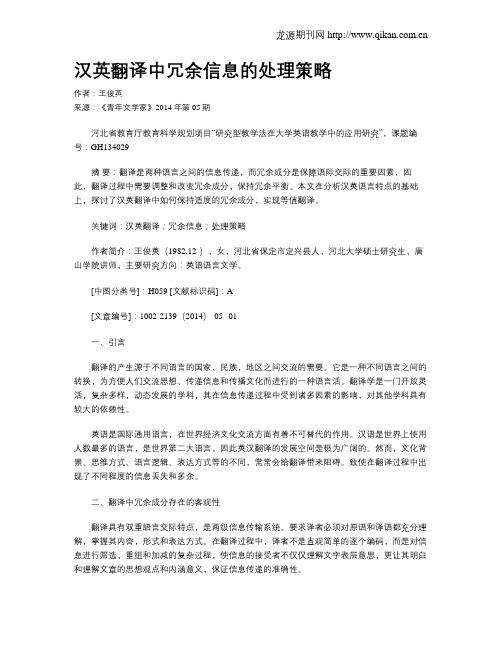
汉英翻译中冗余信息的处理策略作者:王俊英来源:《青年文学家》2014年第05期河北省教育厅教育科学规划项目“研究型教学法在大学英语教学中的应用研究”,课题编号:GH134029摘要:翻译是两种语言之间的信息传递,而冗余成分是保障语际交际的重要因素,因此,翻译过程中需要调整和改变冗余成分,保持冗余平衡。
本文在分析汉英语言特点的基础上,探讨了汉英翻译中如何保持适度的冗余成分,实现等值翻译。
关键词:汉英翻译;冗余信息;处理策略作者简介:王俊英(1982.12-),女,河北省保定市定兴县人,河北大学硕士研究生,唐山学院讲师,主要研究方向:英语语言文学。
[中图分类号]:H059 [文献标识码]:A[文章编号]:1002-2139(2014)-05--01一、引言翻译的产生源于不同语言的国家,民族,地区之间交流的需要。
它是一种不同语言之间的转换,为方便人们交流思想、传递信息和传播文化而进行的一种语言活。
翻译学是一门开放灵活,复杂多样,动态发展的学科,其在信息传递过程中受到诸多因素的影响,对其他学科具有较大的依赖性。
英语是国际通用语言,在世界经济文化交流方面有着不可替代的作用。
汉语是世界上使用人数最多的语言,是世界第二大语言,因此英汉翻译的发展空间是极为广阔的。
然而,文化背景、思维方式、语言逻辑、表达方式等的不同,常常会给翻译带来阻碍。
致使在翻译过程中出现了不同程度的信息丢失和多余。
二、翻译中冗余成分存在的客观性翻译具有双重語言交际特点,是两级信息传输系统。
要求译者必须对原语和译语都充分理解,掌握其内容,形式和表达方式。
在翻译过程中,译者不是直观简单的逐个编码,而是对信息进行筛选,重组和加减的复杂过程,使信息的接受者不仅仅理解文字表层意思,更让其明白和理解文章的思想观点和内涵意义,保证信息传递的准确性。
信息论告诉我们,由于信息传递过程中干扰的无法避免,信息发送者为了保证信息的顺利准确传递,总是在编码时对信息进行重复和叠加,超过接受者的实际需要,这些多出来的信息被称之为冗余信息。
英汉翻译中冗余信息的译法

英汉翻译中冗余信息的译法译者是翻译实践的中心和主体,既是信息的接收者,又是发送者,更是检验者。
语言的交际功能能够得以发展,在很大程度上是由于冗余信息的存在。
冗余信息是语言的客观属性,翻译时有时需要适当地添加相关的冗余信息,有时则要适时地减少一些冗余信息,以求得冗余信息的动态平衡,保证源语信息的准确传递。
文章以常非先生的译本《为奴十二载》为对象来讨论汉英翻译时冗余信息的译法。
标签:冗余信息;英汉翻译;语际交流一、引言美国著名数学家香农(Claude Elwood Shannon)是信息论的创始人,奈达(Eugene A. Nida)创造性地将信息论与翻译研究相结合,提出二者的结合有助于形成原文与译文之间的动态对等。
冗余信息的翻译是奈达动态对等理论的重要组成部分。
冗余信息并不是无用信息,原文与译文之间冗余程度的不同会直接影响目的语读者对原文的理解,因此多研究冗余信息的翻译方法,对翻译活动的有效进行以及实现源语与译语之间的动态对等具有重大指导意义。
二、《为奴十二载》中冗余信息的译法以下根据《为奴十二载》中的实例,分析在翻译过程中如何对冗余信息进行有效处理,以保证翻译活动的顺利进行。
具体实例围绕加注、重复、增加隐含语义、语义丰富化四个具体方面展开。
1.加注例1:In her pilgrimage through the wilderness of bondage,with eyes fixed upon that hope-inspiring beacon,she had at length ascended to“the top of Pisgah①”,and beheld “the land of promise.”译文:她在蛮荒奴役之地一路跋涉,双眼紧盯着希望的灯塔,最终登上了毗斯迦山的山顶,看见了应许之地。
译文注释:①毗斯迦山(Pisgah),位于约旦河东,《圣经》记载摩西从此眺望上帝赐给亚伯拉罕的迦南地方。
从信息论的角度看汉英翻译的冗余现象
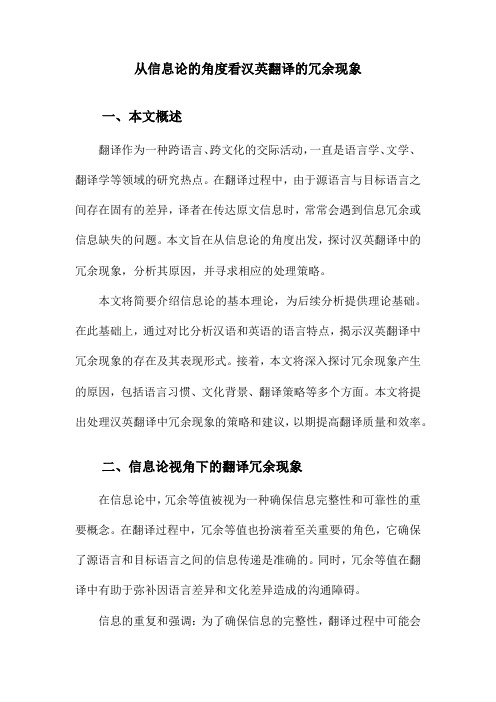
从信息论的角度看汉英翻译的冗余现象一、本文概述翻译作为一种跨语言、跨文化的交际活动,一直是语言学、文学、翻译学等领域的研究热点。
在翻译过程中,由于源语言与目标语言之间存在固有的差异,译者在传达原文信息时,常常会遇到信息冗余或信息缺失的问题。
本文旨在从信息论的角度出发,探讨汉英翻译中的冗余现象,分析其原因,并寻求相应的处理策略。
本文将简要介绍信息论的基本理论,为后续分析提供理论基础。
在此基础上,通过对比分析汉语和英语的语言特点,揭示汉英翻译中冗余现象的存在及其表现形式。
接着,本文将深入探讨冗余现象产生的原因,包括语言习惯、文化背景、翻译策略等多个方面。
本文将提出处理汉英翻译中冗余现象的策略和建议,以期提高翻译质量和效率。
二、信息论视角下的翻译冗余现象在信息论中,冗余等值被视为一种确保信息完整性和可靠性的重要概念。
在翻译过程中,冗余等值也扮演着至关重要的角色,它确保了源语言和目标语言之间的信息传递是准确的。
同时,冗余等值在翻译中有助于弥补因语言差异和文化差异造成的沟通障碍。
信息的重复和强调:为了确保信息的完整性,翻译过程中可能会使用重复或强调的手段来增加冗余。
对于某些文化或语言中可能存在的特殊表达方式或含义,在目标语言中寻找等效的表述可能会有困难。
通过增加冗余信息,可以确保信息的完整性。
语境的考虑:语言中的某些词汇或表达方式只有在特定的语境中才有意义。
在翻译过程中,为了确保目标语言读者能够准确理解原文的含义,译者需要考虑原文的语境,并适当地增加冗余信息。
文化差异的弥补:由于每种语言都承载了其特定的文化背景和价值观,因此在翻译过程中,有时需要增加冗余信息来弥补因文化差异造成的沟通障碍。
提高信息的可靠性:冗余等值确保了原文的信息在翻译过程中得到了完整的传递。
通过重复或强调某些信息,可以降低因语言或文化差异造成的信息损失。
增强可读性:适当的冗余可以使译文更加流畅和易懂。
对于目标语言的读者来说,额外的冗余信息可以帮助他们更好地理解和接受陌生的概念和表达方式。
汉英翻译过程中的负迁移性冗余的特点与对策

汉英翻译过程中的负迁移性冗余的特点与对策摘要:汉译英的翻译过程中常常出现心理学上称为负迁移性的冗余现象,本文结合实例分析其性质和特点,并在上述分析的基础上,提出了相应的对策,对揭示汉英翻译的内在规律及外语教学都有现实的启示意义。
关键词:李克强在2010年世界经济论坛年会上的特别致辞英译本;冗余;负迁移中图分类号:h159 文献标识码:a文章编号:1009—0118(2012)10—0327—02汉语和英语属于截然不同的两套符号系统,两种语言在信息表达方式上存在较大的差异,虽然翻译的重要标准是忠实原文,但这不等于要死译、硬译,对原文亦步亦趋;死译、硬译只是表面的忠实,而不是真正的忠实。
在现实的汉译英翻译实践过程中,往往有来自母语的迁移性冗余信息现象发生,使得许多汉译英的译文明显带有“中国式英语”的特点,这是典型的负迁移,这种负迁移影响了信息交流的效果,因此研究负迁移性冗余的性质和特点,不仅有利于揭示汉英翻译的内在规律,而且对外语教学也有现实的启示意义。
本文所举例句均摘自李克强在2010年世界经济论坛年会上的特别致辞及其英译本。
一、翻译过程中的语言负迁移迁移是心理学的一个重要概念,指的是人们已经掌握的知识在新的学习环境中发挥作用的心理过程。
行为主义心理学把语言学习过程看作行为的形成过程,学习第二语言就是去学习一套新的习惯。
根据行为主义迁移观,母语干扰是造成外语学习的主要困难所在,外语学习的关键就是克服来自母语的负迁移。
一方面,以母语为英语者觉得译文某些表达方式较别扭,难以接受其中的冗余信息,因为含有大量冗余的译文不仅给读者造成过重的心理负荷,且降低了信息的价值,直接影响信息的传播效果。
另一方面,由于迁移机制的作用,译者可能完全觉察不到译文的过度冗余,对某些“中式表达”习以为常。
受母语表达方式的影响,负迁移性冗余在翻译实践中是一个比较普遍的现象,学习者的母语知识可以直接负迁移到译文中。
二、翻译过程中的冗余及对策汉英翻译的冗余现象是由两种语言的不同特点所致,即两种语言表意方式的差异所致。
汉英翻译技巧(2)冗余成分的处理

• 我们强烈要求美国政府就此事件向中国郑 重道歉。
• We demand that US government apologize to China for this incident.
• 如果在译文中加入strongly和solemnly反 而会弱化语气,略去不译,语气不卑不亢, 恰到好处。
3、显性重复(explicit repetition)
• 建立办事高效、运转协调、行为规范的行 政管理体系。
• To set up a high efficient, well-coordinated and standardized administrative system.
• 原文中的“办事”、“运转”和“行为” 都被省略了)
4、隐性重复(implicit repetition)
• 汉语表达讲究平衡对称,用词倾向于 重复这样汉语中有相当多的用同义词 或近义词从结构上是有冗余成分,形 成明显重复。这种重复从汉语角度来 看自然得体,读起来和谐上口,富有 感染力。可是照搬到英语中会显得冗 余过度,妨碍英语读者理解原文的意 义。故汉译英时取意忘形合译或只需 要译出其中一对。
• 贪官污吏 • Corrupt officials • 土崩瓦解 • Fall apart • 半生不熟 • Half-cooked • 赤手空拳 • Bare handed
试论汉英翻译中的赘词及其修改方法5篇
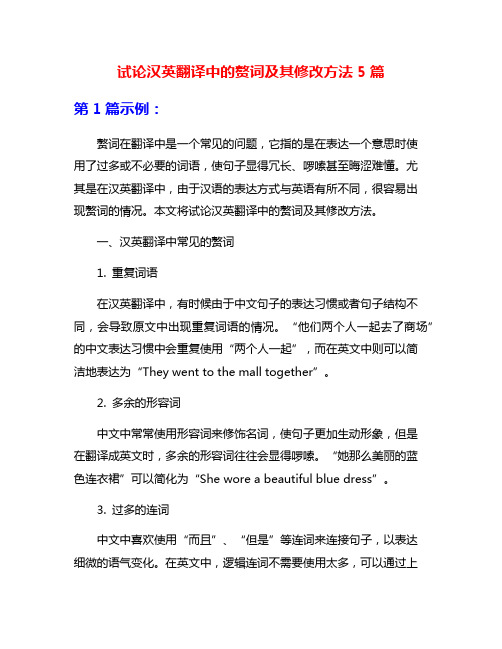
试论汉英翻译中的赘词及其修改方法5篇第1篇示例:赘词在翻译中是一个常见的问题,它指的是在表达一个意思时使用了过多或不必要的词语,使句子显得冗长、啰嗦甚至晦涩难懂。
尤其是在汉英翻译中,由于汉语的表达方式与英语有所不同,很容易出现赘词的情况。
本文将试论汉英翻译中的赘词及其修改方法。
一、汉英翻译中常见的赘词1. 重复词语在汉英翻译中,有时候由于中文句子的表达习惯或者句子结构不同,会导致原文中出现重复词语的情况。
“他们两个人一起去了商场”的中文表达习惯中会重复使用“两个人一起”,而在英文中则可以简洁地表达为“They went to the mall together”。
2. 多余的形容词中文中常常使用形容词来修饰名词,使句子更加生动形象,但是在翻译成英文时,多余的形容词往往会显得啰嗦。
“她那么美丽的蓝色连衣裙”可以简化为“She wore a beautiful blue dress”。
3. 过多的连词中文中喜欢使用“而且”、“但是”等连词来连接句子,以表达细微的语气变化。
在英文中,逻辑连词不需要使用太多,可以通过上下文去理解句子之间的逻辑关系。
“他昨天去了超市,而且买了一些水果”可以简化为“He went to the supermarket yesterday and bought some fruits”。
二、赘词的修改方法1. 简洁明了在翻译中,要尽量保持简洁明了的原则,避免冗长的句子和多余的修饰语。
可以通过删减赘词、合并句子、调整语序等方式来简化句子结构,使翻译更加通顺和易懂。
2. 注意语言习惯在翻译时要注意目标语言的语法和表达习惯,尽量避免直译中文句子的习惯。
可以通过阅读大量的英文文本,培养英文写作能力,逐渐形成适应英文语法的表达方式。
3. 注重上下文在翻译过程中,要注重原文的上下文和语境,根据文章整体的逻辑关系来调整句子结构。
避免死译原文,要根据文章整体内容来传达原文的意思。
三、结语赘词在汉英翻译中是一个常见的问题,需要我们在翻译过程中仔细斟酌,尽量避免冗长啰嗦的表达。
汉英翻译中冗余信息的处理方法探讨

汉英翻译中冗余信息的处理方法探讨汉英翻译中冗余信息的处理方法探讨来源:《齐齐哈尔大学学报(哲学社会科学版)》2007年第04期作者:罗小华摘要:翻译是把一种语言的言语产物在保持内容方面,也就是意义不变的情况下,改变为另一种语言的言语产物的过程。
冗余成分是语言交际能够顺利进行的重要因素之一,它使言外之意显性化、明确化,保证信息接受者的信息量,使译者顺利实现翻译的目的,完成翻译的任务。
但是,在汉英翻译实践中,如果把汉语的冗余成分照搬到英语往往就使英语读者的信息接受与所要传递的信息容量不符,从而影响交际的成功进行。
全文通过实例探讨了如何在汉英翻译中求得“冗余平衡”,实现翻译中冗余信息的动态等值等问题。
关键词:汉英翻译;动态等值;信息冗余Abstract:Translation is a process of changing the words from the source language to the target language without altering their mean. The redundant information is one of the important factors contributing to the success of information transmission. It makes the connotative meaning into the surface level to guarantee the smooth transformation of meanings which helps translators achieve the translation aims. In translation practice, if we put the redundant information in Chinese into English without any shift, we will have extra information or information loss which will make a bad communication. In the article, we put some ways into discussion to achieve dynamic equivalence in Chinese-English translation through some examples.Keywords: Chinese-English translation, dynamic equivalence, redundant information翻译学是一个开放的动态系统,它充分注意了在信息传递过程中有影响作用的其它诸多因素,如传播方式、传播渠道、传播目的、传播的不同对象等,它可以更广泛地借鉴其它学科的研究成果或对其它学科的研究起到影响和指导的作用。
文学作品英译冗余平衡的处理
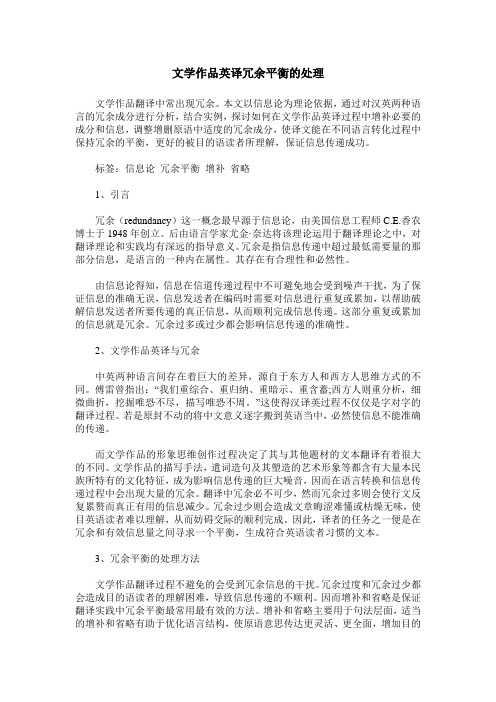
文学作品英译冗余平衡的处理文学作品翻译中常出现冗余。
本文以信息论为理论依据,通过对汉英两种语言的冗余成分进行分析,结合实例,探讨如何在文学作品英译过程中增补必要的成分和信息,调整增删原语中适度的冗余成分,使译文能在不同语言转化过程中保持冗余的平衡,更好的被目的语读者所理解,保证信息传递成功。
标签:信息论冗余平衡增补省略1、引言冗余(redundancy)这一概念最早源于信息论,由美国信息工程师C.E.香农博士于1948年创立。
后由语言学家尤金·奈达将该理论运用于翻译理论之中,对翻译理论和实践均有深远的指导意义。
冗余是指信息传递中超过最低需要量的那部分信息,是语言的一种内在属性。
其存在有合理性和必然性。
由信息论得知,信息在信道传递过程中不可避免地会受到噪声干扰,为了保证信息的准确无误,信息发送者在编码时需要对信息进行重复或累加,以帮助破解信息发送者所要传递的真正信息,从而顺利完成信息传递。
这部分重复或累加的信息就是冗余。
冗余过多或过少都会影响信息传递的准确性。
2、文学作品英译与冗余中英两种语言间存在着巨大的差异,源自于东方人和西方人思维方式的不同。
傅雷曾指出:“我们重综合、重归纳、重暗示、重含蓄;西方人则重分析,细微曲折,挖掘唯恐不尽,描写唯恐不周。
”这使得汉译英过程不仅仅是字对字的翻译过程。
若是原封不动的将中文意义逐字搬到英语当中,必然使信息不能准确的传递。
而文学作品的形象思维创作过程决定了其与其他题材的文本翻译有着很大的不同。
文学作品的描写手法,遣词造句及其塑造的艺术形象等都含有大量本民族所特有的文化特征,成为影响信息传递的巨大噪音,因而在语言转换和信息传递过程中会出现大量的冗余。
翻译中冗余必不可少,然而冗余过多则会使行文反复累赘而真正有用的信息减少。
冗余过少则会造成文章晦涩难懂或枯燥无味,使目英语读者难以理解,从而妨碍交际的顺利完成。
因此,译者的任务之一便是在冗余和有效信息量之间寻求一个平衡,生成符合英语读者习惯的文本。
(2)汉译英:冗余成分的处理

• (8)直到中国实现工业现代化 • A: until China realizes industrial modernizaion. • B: until China modernizes its industry • 以上两例中 ,译文A不够简洁 ,可将其 中的动词略去 ,把相应的名词转化为 动词 ,从而使译文更加符合英语表达 习惯。
(1)经济领域的改革 A: reforms in the sphere of the economy B: reforms in the economy (2)我们必须反对铺张浪费的做法。 A: We must oppose the practice of extravagance. • B: We must oppose extravagance. • 以上两例中的范畴词 ,如将其直接译成英语 (如 译文 A) ,不仅行文啰嗦 ,也不符合英语的表达习 惯。汉语中其它的范畴词还有:任务、现象、情况、 因素、局面、状况、态度等 ,在英译时可适当省 译 ,再如:
.
• 1、范畴词 (category word)
• 汉语里有些“范畴词”,其本身没有什么具体 含义,只是重复地概括已表达的意思,但它们 在语法上却是不可缺少的词,如“环境”、 “工作”、“状态”、“时期”、“历史”、 “情况”、“因素”等。这类词语表明事物的 范畴或属性,大多没有实质内容。若把他们搬 到英语中势必冗余过多,因此应该把他们省略 不译。
Hale Waihona Puke (3)我们要重视沿海与内地贫富差距问题。 • A: We must pay close attention to the problem of the gap between coastal and inland areas. • B: We must pay close attention to the gap between coastal and inland areas.
汉英文学翻译中冗余信息的处理
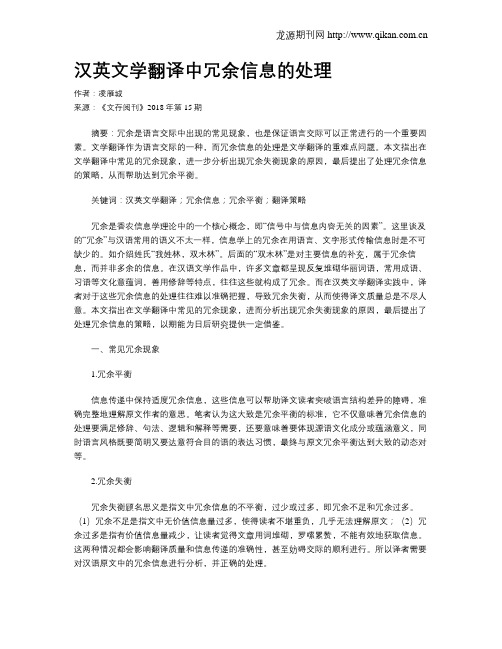
汉英文学翻译中冗余信息的处理作者:凌雁城来源:《文存阅刊》2018年第15期摘要:冗余是语言交际中出现的常见现象,也是保证语言交际可以正常进行的一个重要因素。
文学翻译作为语言交际的一种,而冗余信息的处理是文学翻译的重难点问题。
本文指出在文学翻译中常见的冗余现象,进一步分析出现冗余失衡现象的原因,最后提出了处理冗余信息的策略,从而帮助达到冗余平衡。
关键词:汉英文学翻译;冗余信息;冗余平衡;翻译策略冗余是香农信息学理论中的一个核心概念,即“信号中与信息内容无关的因素”。
这里谈及的“冗余”与汉语常用的语义不太一样,信息学上的冗余在用语言、文字形式传输信息时是不可缺少的。
如介绍姓氏“我姓林,双木林”。
后面的“双木林”是对主要信息的补充,属于冗余信息,而并非多余的信息。
在汉语文学作品中,许多文章都呈现反复堆砌华丽词语,常用成语、习语等文化意蕴词,善用修辞等特点,往往这些就构成了冗余。
而在汉英文学翻译实践中,译者对于这些冗余信息的处理往往难以准确把握,导致冗余失衡,从而使得译文质量总是不尽人意。
本文指出在文学翻译中常见的冗余现象,进而分析出现冗余失衡现象的原因,最后提出了处理冗余信息的策略,以期能为日后研究提供一定借鉴。
一、常见冗余现象1.冗余平衡信息传递中保持适度冗余信息,这些信息可以帮助译文读者突破语言结构差异的障碍,准确完整地理解原文作者的意思。
笔者认为这大致是冗余平衡的标准,它不仅意味着冗余信息的处理要满足修辞、句法、逻辑和解释等需要,还要意味着要体现源语文化成分或蕴涵意义,同时语言风格既要简明又要达意符合目的语的表达习惯,最终与原文冗余平衡达到大致的动态对等。
2.冗余失衡冗余失衡顾名思义是指文中冗余信息的不平衡,过少或过多,即冗余不足和冗余过多。
(1)冗余不足是指文中无价值信息量过多,使得读者不堪重负,几乎无法理解原文;(2)冗余过多是指有价值信息量减少,让读者觉得文章用词堆砌,罗嗦累赘,不能有效地获取信息。
浅谈口译中冗余信息的处理策略

的 需要 ,而 使用 叠 词,如 “ 他 兢兢业 业 ,刻苦 勤奋 ,多才 “ 冗 余 现 象是 语 言 固有 的特 征 ,据 专家 统 计 ,英语 语 多 艺 ” ,其 实句 中 “ 兢兢 业 业 ,刻 苦勤 奋 ,多 才 多艺 ”这 篇 中 的冗 余度 在 6 0 %到 8 O %, 约 占全 篇 的 3 / 4 【 】 】 。 ” 口译 些词语 前后 两 部分 的意义 是一样 的 ,译 出它们 的实质 意义 中也不例 外 的存在 冗余 信息 。从语 言学 的角 度考 虑冗余 信 即 可 。 息可 以分 为语 义 冗余 ,词汇 冗余 ,语法 冗余 以及 文化 冗余 ( 三 )改 变 结 构 等 。 以下将举 例一一 阐述 说 明。 改 变结 构 即对 译 语所 不 习惯 的 原 语话 语 做 出结 构 的 ( 一) 语 义 冗余 调整 ,尤其 是在 口译中冗 长 的复合 句 ,译 员必 须使 用短 时 口译 中的语 义冗余 主要 是 ,因为英 汉语 在词 汇方 面有 “ 工 作 记 忆 ”+长 时记 忆 的方 式进 行 智 力 的 加 工 处理 f 2 】 。 很 大 的不 同,词语 的使 用频 率及 词间 的各种 语义 关系 都有 可见 改变结 构 的方 法适 合于处 理 口译 中结 构冗余 的句 子 。 差别 。 ( 四) 替代 或加 注法 ( 二) 词汇 冗余 对 于 口译 中 的文化 冗 余信 息 则应 该 采取 替代 或 加注 。 “ 英 汉 民族 的思维 方 式 不 同,汉 民族语 言 表达 回环 、 由于 口译 面对 的是 不 同文化背 景 的听者 ,要想 保 留译语 的 反 复 , 写作 风 格 细 腻 、 委婉 , 语 义 间经 常 重 复 或 相互 包 民族 文化特 色 ,那就 必须 要添 加相 应的 文化冗 余信 息 。比 含 ;而 英 民族注 重直线 思维 ,语 言表达 直截 了当 ,在 英语 如有 些文化 习俗 ,历史 典故 ,要想 直接翻 译就 必须 要有 加 中把 已知信 息 当做未 知信 息重提 或重 复 已明显 隐含 在 已知 注 ,不然读 者是 不 明 白其 意思 的。 信 息 中的 内容视为 浪费 时间 口 】 。 ” 四、 结 语 ( 三) 语 法 冗余 由以上分 析可 以看 出,冗 余信 息是 客观存 在 的,在 口 “ 奈 达在论述 冗余在翻 译 中的作用时指 出 :翻 译不能 一 译 的过程 中 ,对于 不 同的冗余 信息 采取 不 同的处理 策略 来 味 只重视 词汇 的对应 程度 ,而应 该 以动 态等值 为标 准 ,并 达 到平衡 。有 时 需要适 当添 加冗余 ,有 时要 减少 冗余 ,只 提 出从一种 语 言结构 转换 成另 一种语 言 文化 结构 时,优 秀 有 这样才 可 以保证 语 言源信 息 的准确传 递 。作为 译者 ,必 的译文 一般 比原文稍 长 【 l 】 。 ”由于英 汉语在 语法方 面的差 异 须 清 楚冗 余信 息 在英 汉 语 中 的不 同,找 到适 当的 目的 语 , 造成 英语 中存在 很 多 的虚 词但 在 语法 上 却是 不 可缺 少 的, 以便使 得 目的语信 息 的近似 等值 。本文 限于 篇幅 ,只 讨论 如不定冠词 a , a n , 定冠词 t h e 等都 是英语语 法中必需 的 。 了几种常 见 的冗余 ,当然还 有待 于进 一步 的讨 论 。 ( 四) 文化 冗余 依据 语言是文化 的载体这 一特征 ,口译 中还存在文 化冗 参 考文 献 : 【 1 ] Ni d a EA p p r o a c h e s t o T r a n s l a t i o n i n t h e We s t e r n Wb d dBe i j i n g 余。英汉语有着 不同的文化渊源 ,因此 承载着不 同的文化 信 o r e i g nL a n g u a g ea n dRe s e a r c h , 1 9 8 4 . 息,所 以英汉语到 的表 达方式不 同但 是在 口译 中,面对异 文 F 化听者因为缺 乏对异族文化的 了解 , 口译员就必须加入 一定 【 2 ] 鲍刚, 刘和平 . 口译理论概述 【 M】 . 北京, 中国对外翻译 的冗余成分 即文化冗余信 息,才 能使交际顺利进行 。 出版 公 司 , 2 o 0 5 . 三 、冗 余信 息 的 处理 策略 [ 3 ] 廖 七一 . 论翻译 中的冗余信息 . 外国语 , 1 9 9 6 .
英汉译语冗余的解决方法

英汉译语冗余的解决方法
英汉译语冗余的解决方法有以下几种:
1. 简化译文:可以尝试使用更简洁的表达方式来避免冗余。
删去无关紧要的修饰词或重复的信息,保留核心内容。
2. 去除冗余短语:译文中经常会出现一些无实际意义的冗余短语,如“事实上”、“实际上”等。
可以将这些短语去除,使译文更加简洁明了。
3. 使用同义词:在一些情况下,可以使用同义词来替代原文中的某些词语,以避免冗余。
但是要注意同义词的使用要准确,并且不改变原文的意思。
4. 重组句子结构:有时候重新组织句子的结构可以避免冗余。
可以尝试将一些信息移到其他句子中,或者重新安排句子的顺序,使得译文更加简洁明了。
5. 多次审校:在翻译过程中,多次审校译文可以帮助发现冗余的问题。
通过不断地修改和优化,可以逐渐减少冗余的现象。
试论汉英翻译中的赘词及其修改方法
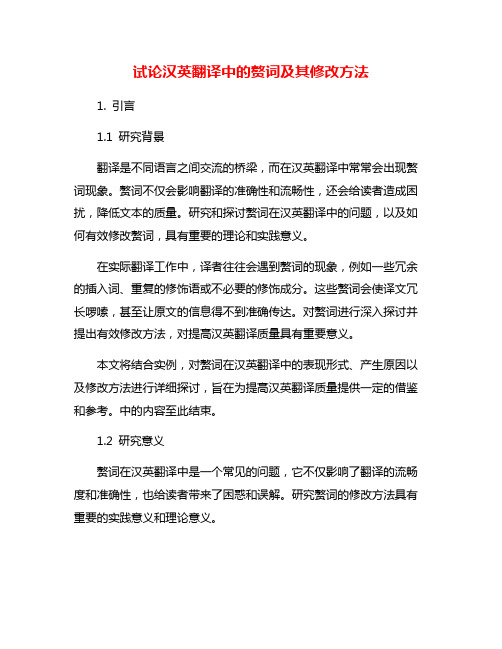
试论汉英翻译中的赘词及其修改方法1. 引言1.1 研究背景翻译是不同语言之间交流的桥梁,而在汉英翻译中常常会出现赘词现象。
赘词不仅会影响翻译的准确性和流畅性,还会给读者造成困扰,降低文本的质量。
研究和探讨赘词在汉英翻译中的问题,以及如何有效修改赘词,具有重要的理论和实践意义。
在实际翻译工作中,译者往往会遇到赘词的现象,例如一些冗余的插入词、重复的修饰语或不必要的修饰成分。
这些赘词会使译文冗长啰嗦,甚至让原文的信息得不到准确传达。
对赘词进行深入探讨并提出有效修改方法,对提高汉英翻译质量具有重要意义。
本文将结合实例,对赘词在汉英翻译中的表现形式、产生原因以及修改方法进行详细探讨,旨在为提高汉英翻译质量提供一定的借鉴和参考。
中的内容至此结束。
1.2 研究意义赘词在汉英翻译中是一个常见的问题,它不仅影响了翻译的流畅度和准确性,也给读者带来了困惑和误解。
研究赘词的修改方法具有重要的实践意义和理论意义。
赘词的存在直接影响到翻译的质量和效果。
过多的赘词会使句子显得冗长、啰嗦,甚至失去原文的意思。
而正确地修改赘词能够使翻译更加简洁、准确,更符合英语表达习惯,提高读者的阅读体验。
研究赘词的修改方法有助于提高翻译者的专业水平。
通过对赘词修改方法的探讨和实践,翻译者可以更加深入地理解语言的规范和特点,提升对英语表达的敏感度和准确度,从而提高翻译质量。
研究赘词在汉英翻译中的修改方法具有重要的意义,不仅可以提高翻译质量,也有利于促进翻译理论的深入发展。
本文旨在探讨赘词修改方法,为汉英翻译工作提供更加规范和有效的指导。
2. 正文2.1 赘词的概念分析赘词是指在文本中出现并非必要的、多余的词语或短语。
在汉英翻译中,赘词的出现常常会影响原文的表达或造成译文的累赘,从而影响整体的翻译质量。
赘词的概念分析可以从语言学和翻译理论的角度来进行。
从语言学的角度来看,赘词是指没有实际意义或功能的词语,其出现并不会对句子的逻辑结构和语法关系产生影响。
口译中的冗余处理

4、适应交际情境:冗余现象可 以反映人们在特定情境下的交际 需求和习惯。
1、冗余信息过多可能导致信息过载和注意力分散。 2、过度依赖冗余信息可能导致思考能力下降。
3、不当的冗余信息可能会造成误解或沟通障碍。
谢谢观看
4、职业规划:根据自我认知和市场调研的结果,大学生可以制定自己的职 业目标和发展方向,制定切实可行的职业规划。
四、结语
就业探索是大学生职业生涯规划的重要组成部分,对于提升就业竞争力和实 现个人职业发展具有重要意义。通过自我认知、市场调研、实习实践和职业规划 等步骤,大学生可以更好地适应职场,实现个人职业发展。
策略
为了更好地进行冗余处理,口译员可以采取以下策略:
1、训练:口译员应接受系统的训练,提高自己的语言能力、听力理解力和 口语表达能力。这有助于他们更好地理解源语言的信息,并在翻译过程中做出适 当的冗余处理。
2、技巧:口译员应掌握一些翻译技巧,如如何简化句子结构、如何整合零 散的信息点等。这些技巧可以帮助他们在保证信息准确性的前提下,更好地进行 冗余处理。
在定性分析方面,我们对语料库中的冗余现象进行了手动标注和分类。我们 根据冗余信息的功能和特点,将其分为不同的类型,如重复、赘述、暗示等。同 时,我们还对不同类型冗余现象的交际效果进行了分析。
结果与讨论
通过定量和定性分析,我们发现言语交际中的冗余现象具有以下特点:
1、冗余现象在不同类型的言语交际中普遍存在。无论是口语对话还是书面 交流,人们都会使用一定程度的冗余信息。
参考内容
在英语商务信函的翻译中,冗余处理是一个重要的概念。从信息论的角度来 看,冗余指的是在传输或存储信息时所使用的额外或不需要的信息。在翻译英语 商务信函时,冗余处理可以帮助译者更好地传达原文的意思,同时也可以更好地 满足目标读者的需求。
汉英翻译中的冗余现象
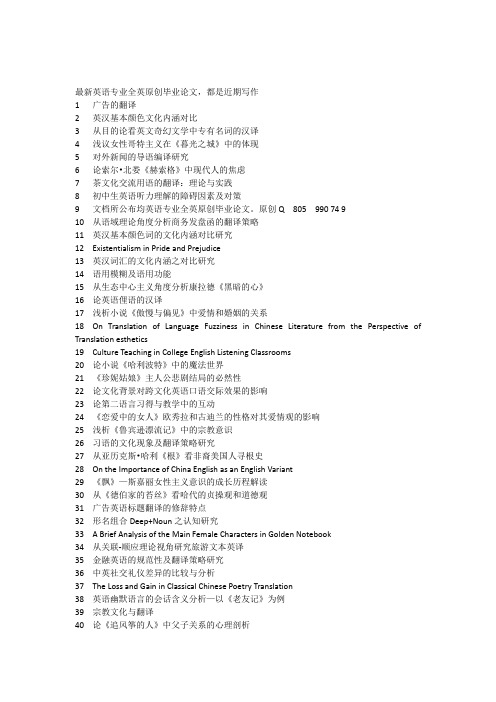
最新英语专业全英原创毕业论文,都是近期写作1 广告的翻译2 英汉基本颜色文化内涵对比3 从目的论看英文奇幻文学中专有名词的汉译4 浅议女性哥特主义在《暮光之城》中的体现5 对外新闻的导语编译研究6 论索尔•北娄《赫索格》中现代人的焦虑7 茶文化交流用语的翻译:理论与实践8 初中生英语听力理解的障碍因素及对策9 文档所公布均英语专业全英原创毕业论文。
原创Q 805 990 74 910 从语域理论角度分析商务发盘函的翻译策略11 英汉基本颜色词的文化内涵对比研究12 Existentialism in Pride and Prejudice13 英汉词汇的文化内涵之对比研究14 语用模糊及语用功能15 从生态中心主义角度分析康拉德《黑暗的心》16 论英语俚语的汉译17 浅析小说《傲慢与偏见》中爱情和婚姻的关系18 On Translation of Language Fuzziness in Chinese Literature from the Perspective of Translation esthetics19 Culture Teaching in College English Listening Classrooms20 论小说《哈利波特》中的魔法世界21 《珍妮姑娘》主人公悲剧结局的必然性22 论文化背景对跨文化英语口语交际效果的影响23 论第二语言习得与教学中的互动24 《恋爱中的女人》欧秀拉和古迪兰的性格对其爱情观的影响25 浅析《鲁宾逊漂流记》中的宗教意识26 习语的文化现象及翻译策略研究27 从亚历克斯•哈利《根》看非裔美国人寻根史28 On the Importance of China English as an English Variant29 《飘》—斯嘉丽女性主义意识的成长历程解读30 从《徳伯家的苔丝》看哈代的贞操观和道德观31 广告英语标题翻译的修辞特点32 形名组合Deep+Noun之认知研究33 A Brief Analysis of the Main Female Characters in Golden Notebook34 从关联-顺应理论视角研究旅游文本英译35 金融英语的规范性及翻译策略研究36 中英社交礼仪差异的比较与分析37 The Loss and Gain in Classical Chinese Poetry Translation38 英语幽默语言的会话含义分析—以《老友记》为例39 宗教文化与翻译40 论《追风筝的人》中父子关系的心理剖析41 从文学伦理阐释《榆树下的欲望》母杀子的悲剧42 “I”and Rebecca--A Study on the Comparison of Two Female Characters in Rebecca43 英语复合名词的认知语义研究44 An Eco-Critical Approach to Moby Dick45 元认知策略指导下的英语专业高年级学生听力学习46 《玛丽巴顿》和《南方与北方》中的劳资冲突比较分析47 An Analysis of the Religious Elements in Robinson Crusoe48 从《胎记》看霍桑对科学的态度49 从《金色笔记》看多丽丝•莱辛的女性意识50 论《哈克贝里芬历险记》中的口语化语言、幽默讽刺和地方色彩51 从符号学角度分析《了不起的盖茨比》中主人公住所的隐含意义52 网络语言风格的性别差异53 从目的论角度看公司网页误译54 论莎士比亚戏剧作品中的父权意识55 浅析哈代笔下经典女性苔丝和苏的人物形象56 《小妇人》--家庭教育对儿童个性的影响57 论译文质量保证的途径58 An Analysis of Hemingway' Religious Complex in The Old Man and the Sea59 On Children’s Psychological Needs from Harry Potter60 分析海明威在《永别了,武器》中的悲剧意识61 中西方酒店文化比较与探讨62 《园会》中男性人物性格作用分析63 英美电视剧中双关语的字幕翻译64 从《达罗卫夫人》看弗吉妮娅伍尔夫的个性65 《外星人》电影海报的多模态话语解析66 从功能对等理论看《哈利波特》小说中魔法生物名的翻译67 浅析《老人与海》中的悲剧色彩68 从心理分析的角度探索《马贩子的女儿》中主要人物的心理现象69 A Comparison of the English Color Terms70 《人性的污点》中主要人物的悲剧命运与社会原因的分析71 英语语句模糊性分析72 功能对等理论下罗慕士《三国演义》英译本成语翻译研究73 初中英语提问策略教学研究74 美国个人主义与中国集体主义的比较75 《麦田里的守望者》中霍尔顿的追求和理想的分析76 探析《愤怒的葡萄》中人性的力量77 《黑暗之心》主人公马洛的性格分析78 A Comparison of the English Color Terms79 On Translation of Symbolism in Pop Songs with a Case Study of Hotel California80 Translation Strategies of Two-part Allegorical Sayings81 论奥康纳短篇小说的创作特色82 会话原则在国际商务谈判中的运用83 论《推销员之死》中的父子关系84 On the Absurdity in Waiting for Godot85 从功能对等理论的角度看英语新闻标题中修辞的翻译86 探讨英语翻译教学中的问题及改进87 女性主义视角下《白象似的群山》与《莳萝泡菜》中男性形象的对比研究88 约翰.邓恩诗歌艺术陌生化89 女性主义角度解读《董贝父子》中伊迪丝的堕落女性形象90 On the Dramatic Conflicts Contributing to Eliza Doolittle’s Pursuit of Self-identity in Pygmalion91 浅析海明威文学作品中的女性形象92 女性社会价值的深情呼唤—小说《到灯塔去》中拉姆齐夫人和莉丽人物形象的对比研究93 英语谚语的民族性及其艺术特色94 试论霍桑小说《胎记》中的象征主义95 特洛伊战争电影改编的语境探析96 The Analysis of the Tragic Fate of Tess in Tess of The D'Urbervilles97 金庸武侠英译中的文化传递98 论奥斯卡王尔德童话中的唯美主义99 从目的论角度分析中医药药品说明书的英译100 On Chinese-English Advertisement Translation from the Perspective of the Skopos Theory 101 On Sister Carrie’s Broken American Dream from the Perspective of Psychology102 《阿Q正传》中文化负载词的翻译103 An Analysis of Conversational Implicature In Pride and Prejudice104 Communicative Functions of Silence in Conversations105 A Naturalistic Approach to Jude’s Tragedy in Jude the Obscure106 析《虹》中的象征意义107 课后练习在初中英语课堂教学中的作用108 中国传统文化中特色词语的翻译109 情景教学法在小学英语教学中的运用110 《哈利•波特》系列里恐怖美的研究111 从《人生的枷锁》中三个女性看毛姆的婚爱观112 《黄鹤楼》五个英译本的语义等值研究113 论中西文化的差异对习语翻译的影响114 论外交英语的模糊性115 《永别了,武器》中的自然象征意义116 广告英语翻译中的归化和异化策略117 英语教学中的跨文化意识的培养118 生态哲人约翰斯坦贝克119 论《小妇人》中的超验主义思想120 浅析《麦田里的守望者》中的部分重要象征物121 美国电影作品中英雄主义所隐含的美国社会文化122 英语报刊中的新词浅析123 基于合作原则的金凯瑞式美国幽默分析124 美国黑人英语在电影中的应用研究125 圣经的女性意识126 Translation Strategy on Culturally-loaded Expressions in Prison Break127 黑人英语与非裔美国黑人文化的研究128 英语中的性别歧视129 浅析英语习语的翻译原则和方法130131 从合作原则看英语广告中模糊语言的运用及解读132 从春节与圣诞节习俗看中西方文化差异133 A Comparison of the English Color Terms134 On the Importance of China English as an English Variant135 语结与英语长句的翻译136 由《呼啸山庄》的爱与恨讨论艾米丽•勃朗特的写作心理137 英语新闻中批评性语篇的对比分析138 《红楼梦》两个译本中称呼语翻译的对比研究139 《红字》中女权主义意识探析140 论关联理论对旅游资料英译的指导意义141 英语交际中害羞心理产生的根源及其克服方法142 论接受理论对儿童文学作品的影响——以《快乐王子》中译本为例143 从语用等效角度透析旅游景点名称英译144 《嘉莉妹妹》中的自然主义145 对《璃琅三部曲》中爱尔兰人的人性分析146 论身势语的跨文化交际应用147 “上”和“下”的意象图式及概念映射148 On Stylistic Features of Obama’s Victory Speech149 《推销员之死》中美国梦破灭的主要原因150 对比评析《了不起的盖茨比》中尼克和盖茨比的梦想151 冯尼格特《哈里森•伯格朗》中的反乌托邦152 从顺应理论的角度对广告翻译的分析153 试析《我的安东妮娅》中的生态伦理观154 从中西文化差异的角度浅析商宴之道155 A Comparison of the English Color Terms156 遗忘曲线在记忆英语词汇中的运用157 从文化内涵的角度看汉语动物习语的英译158 《儿子与情人》与《雷雨》中母子关系的对比159 高中英语听力课中的文化教学160 分析奥利弗退斯特悲剧生活的原因161 巧克力包装的研究162 Irony Art in Orwell’s Animal Farm163 英语中无意歧义产生的原因及其解决方法164 论莎士比亚《尤利乌斯凯撒》墓地演说中的人际意义的实现手段165 合作学习在高中英语写作教学中的应用166 中餐菜名英译中的文化亏损现象探析167 从文化差异的角度论文学译者的翻译技巧168 目的论视角下的字幕翻译策略—以英剧《神探夏洛克》为例169 图式理论与初中英语写作教学170 农村初中英语口语教学现状的调查与分析——以xx中学为例171 A Comparative Study of American and Chinese Spatial Language in Business Negotiation172 《看不见的人》的主人公形象解析173 中国文化特色词汇的音译与中国文化的传播174 乔治•艾略特小说中的维多利亚女性形象和女性问题175 试析中英婚姻生活差异及其原因176 用合作原则和礼貌原则分析网络聊天室会话的含义177 The Interpretation of A Rose for Emily from the Perspective of Feminism178 英语委婉语及其翻译179 简奥斯丁的女权主义在《理智与情感》中的体现180 从适应与选择角度看公示语翻译方法181 An Analysis of Daphn e du Maurier’s Female Identity Anxiety Reflected in Rebecca 182 中西方礼仪文化差异比较183 意象图式研究184 灰姑娘文学形象在西方文化中的发展和演变研究185 A Study of Narrative Techniques in Barn Burning186 导游词翻译中的跨文化意识187 《了不起的盖茨比》中的人物分析188 从《喜福会》母女代沟看中西文化冲突189 普通话对英语语音的迁移作用190 On the Translation of Names of Scenic Spots191 中英网络词汇语用特征对比192 英雄精神的回归—浅析《雨王汉德森》的主题193 从女性角度分析《喧哗与骚动》中的堕落与升华194 从生态批评角度解析杰克•伦敦的动物小说《野性的呼唤》和《白獠牙》195 对《红字》中丁梅斯代尔的心理分析196 企业网络营销策略分析197 从译者的读者意识看童话英汉翻译198 中西文化中颜色词的象征意义199 译者主体性观照下的中文菜名英译。
论“汉英翻译中如何处理冗余现象”
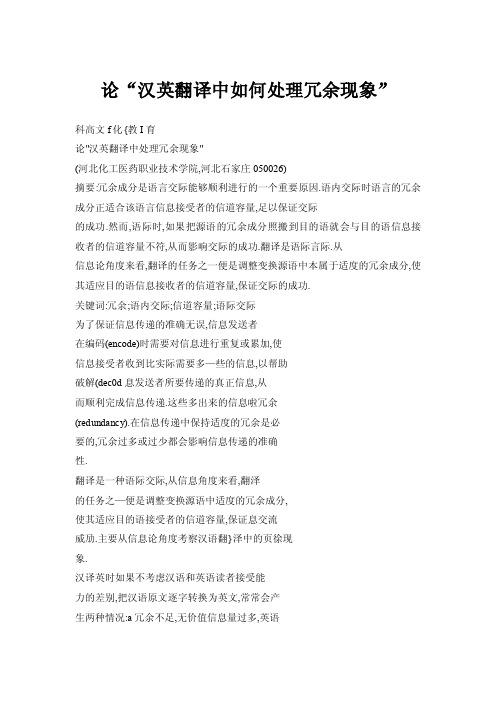
论“汉英翻译中如何处理冗余现象”科高文f化{教I育论"汉英翻译中处理冗余现象"(河北化工医药职业技术学院,河北石家庄050026)摘要:冗余成分是语言交际能够顺利进行的一个重要原因.语内交际时语言的冗余成分正适合该语言信息接受者的信道容量,足以保证交际的成功.然而,语际时,如果把源语的冗余成分照搬到目的语就会与目的语信息接收者的信道容量不符,从而影响交际的成功.翻译是语际言际.从信息论角度来看,翻译的任务之一便是调整变换源语中本属于适度的冗余成分,使其适应目的语信息接收者的信道容量,保证交际的成功.关键词:冗余;语内交际;信道容量;语际交际为了保证信息传递的准确无误,信息发送者在编码(encode)时需要对信息进行重复或累加,使信息接受者收到比实际需要多—些的信息,以帮助破解(dec0d息发送者所要传递的真正信息,从而顺利完成信息传递.这些多出来的信息啦冗余(redundancy).在信息传递中保持适度的冗余是必要的,冗余过多或过少都会影响信息传递的准确性.翻译是一种语际交际,从信息角度来看,翻泽的任务之—便是调整变换源语中适度的冗余成分,使其适应目的语接受者的信道容量,保证息交流威劢.主要从信息论角度考察汉语翻}泽中的页徐现象.汉译英时如果不考虑汉语和英语读者接受能力的差别,把汉语原文逐字转换为英文,常常会产生两种情况:a冗余不足,无价值信息量过多,英语读者不堪重负,几乎无法理解原文:h冗余过多,价值信息量减少,英语渎者觉得原文用词堆砌,,罗嗦累赘,在原地兜圈子.这两种情况都会妨碍交际的成功,故译者有必要调整变换汉英翻译中的冗余成分,以利于交际的成功.l冗余不足需要变简为繁,增词加注(ampli—fication).汉语中有些习惯说法,翻译时如果仅仅照字面意思对号入座,会使英语读者不知所云,信息量过大,属于冗余不足.此时,译者应该在英语译文中增加冗余成分,适当地增词加注,补足汉语原文的蕴含意义或文化内涵,照顾英语凄者的理解接受能力.例1:中国人民政治协商会议theChinesePeople'sPoliticalConsultative Conference,China'STopadvisorybody.例2:全国人民代表大会theNationalPeople'SCongress,China'S supremelegislation/toplaw-makingbody/topleg—islature以上两个政治机构名称英译时常以同位语的形式补充其功能,以便英语读者理解,中国的主要对外媒体常用这种因冗余不足而增词加注的手法, 英语国家的报刊杂志在表述中国文化特有概念时同样如此.因为典故,俗语,习语蕴含着特定的文化意义和历史意义,本国人一看就明白.但是文化背景和国情大不相同的泽文读者看来,却如坠烟云, 照字面直译成英语,译文可能会变得毫无意义,甚至产生误解.例3:清明节TheBrightnessDay,afestivalwhenChinesetraditionallypayhomagetotheirancestors."清明节"是中国的传统节日,不补充其内涵,恐怕无法iE英语读者理解.2冗余过度需删繁就简,减词求实(omission).汉语中某些习惯表达法含有适度的冗余成分,若逐词对译成英语,会译文冗余过多,违反英文简练的风格.在这种情况下,译者应放开手脚,删支赘语, 改头换面,使译文符合英语行文习惯和读者的审美情趣.2.1范畴词(caleg0ryword).汉语里有些"范畴词",其本身没有什么具体含义,只是重复地概括已表达的意思,但是,从语法上不可缺少或空缺的词, 如:'弼晓","工作","状态","时期","历史","情况", "因素"等.这类词语表明事物的范畴或属性,大多没有实质内容.若把他们搬到英语中势必冗余过多,因此应该把他们省略不译.例4:干热环境fdrv heat);计划生育工作(f~ilyplanning);落后状态(backwardness);中国的现代化建设(China'smod—emization);促进和平统一事业promotepeaceful reunificaⅡo;等等,这些划线词都没有译成英文,否则就会显得生硬,累赘.2-2华而不实的修饰词mpousword)汉语中有些修饰词表示强调,增强语气或保持结构工整,本身无实际意义.例如,"胜利召开", "彻底粉碎","毫无根据的诽谤","不切实际的幻想"中的修饰词在汉语里都说得通,意义重复却不显得累赘,属于适度的冗余成分,符合汉语行文习惯,读起来颇有气势.但是在直泽成英语,就显得不合逻辑.这是需要仔细斟酌,反复推敲,略去不译或改变译法.例5.依法严厉打击各种犯罪活动,坚决扫除黄赌毒等社会丑陋现象. Wemustcrackdownonallcrimihalacfivi- tiesaccordingIOthelawanderadicatesuchSO—eialevilsaspornographygamblinganddragabuse andtraffickin~英语中cmckdown/eradicate语气本来就很强烈,无须再用修饰词.例6.我们强烈要求美国政府就此事件向中国郑重道歉. WedemandthatUSgovernmentapologizeto Chinaforthisincident.如果在译文中加入strongly和solemnly反而会弱化语气,略去不译,语气不卑不亢,恰到好处. 23明显重复(explieitrepetition)汉语表达讲究平衡对称,用词倾向于重复.这样汉语中有相当多的用同义词或近义词从结构上是有冗余成分,形成明显重复.这种重复从汉语角度来看自然得体,读起来和谐上口,富有感染力.可是照搬到英语中会显i涮度,妨碍英语读者理解原文的意义.故汉译英时取意忘形,合译或只需要译出其中一对.例7."贪官污吏":corrupofficial;"土崩瓦解":fallapart:"半生不熟":half-ceoked;"赤手空拳":barehanded;例8.建立办事高效,动转协调,行为规范的行政管理体系.Tosetupahighefficient,well—coordinated andstandardizedadministrativesystem.(原文中的"办事","运转"和"行为"都被省略了)例句中汉译英时没有必要——译出,采用其中—个四字格词组译出~lln-I.如果翻译逐字翻译或,不能违背英语的表达习惯.24稳陛重复Gmplicitrepetition)与显性重复结构不同,有时两个汉语词的词性,词形明显不同,但在语义匕有所重复或重叠.而只有译成英语才能表现出来.例9.提交项目可行性研究报告Submitthefeasibilitystudyforthepmject.英语中study一词本身就有'硼究行为"与"研究的书面成果"两层意思,故"报告"呈隐性重复,忽略不译.这也叫作''零翻译".例10.AmericanBrands(NewY ork)美国商标公司国纽约)Applecomputer苹国计算机公司(美国)由例子可以看出在英美国家常用表示从事的行业的词来表示"公司"的意思,而不用company或eorpmtion等词睐翻诨公司的名称.在我们国家的一些街道也能看到这样的牌子.例11.上海大众汽车特约维修站.SharlghaiV olkswagenServiceStation旅游咨询服务中心TourismInformationServiceCenter社会保障事业管理中心SocialSecurityAdministrationCenter中国^寿保险公司ChinaLifeInsuranceCompany通过例子,我们可以看到翻译的句子基本上忠实原文又通顺,仔细观察就会发现每—个句子都犯了照搬隐性重复结构的错误.英语中的admin—istration和service两词兼有"管理行为","服务行为",和"管理处","服务处'两层意义.因此,以上各译句中的center/station和company均谓画蛇添足.删掉冗余,更合乎英语习惯而目语言地道.其实只要多留意外国公司,机构,组织的正式英文名称便不难避免以上错误.汉英翻译有时需要增加冗余,有时需要减少或不译冗余.其目的是为了准确传达源语信息,照顾目的语读者的理解能力和目的语语言习惯,保证信息传递的成功.在翻泽的过程中,译者的任务之—是调整变换源语中的冗余部分,用适当的目的语表达.从信息论的角度来看,这两种差异实际E是统一的,因为翻译既是语际交际,又是跨文化交际Ontercuhuralcommunication).责任编辑:杨帆-220-~。
- 1、下载文档前请自行甄别文档内容的完整性,平台不提供额外的编辑、内容补充、找答案等附加服务。
- 2、"仅部分预览"的文档,不可在线预览部分如存在完整性等问题,可反馈申请退款(可完整预览的文档不适用该条件!)。
- 3、如文档侵犯您的权益,请联系客服反馈,我们会尽快为您处理(人工客服工作时间:9:00-18:30)。
(11)严重的自然灾害 A: a serious natural disaster B: a natural disaster (12)这一理论是党的宝贵精神财富。 A: That theory is a valuable ideological treasure of the Party. B: That theory is an ideological treasure of the Party. 例 (11)、(12)中的形容词与其所修饰的名词形 成了信息冗余 , disaster一词蕴含着 serious之意 , 而 treasure也无需 valuable来修饰。再如:
汉语名词在译成英语时 ,如果该名词表达的意 思已体现在相应的动词中 ,也需要对原文进 行省译 ,如: (6)加快经济改革步伐 A: to accelerate the pace of economic reform B: to accelerate economic reform 译文 A中的动词 accelerate已经包含了the pace of 的意思 ,因此应将冗余信息略去。
我们强烈要求美国政府就此事件向中国郑 重道歉。
We demand that US government apologize to China for this incident. 如果在译文中加入strongly和solemnly反 而会弱化语气,略去不译,语气不卑不亢, 恰到好处。
3、显性重复(explicit repetition) 汉语表达讲究平衡对称,用词倾向于 重复这样汉语中有相当多的用同义词 或近义词从结构上是有冗余成分,形 成明显重复。这种重复从汉语角度来 看自然得体,读起来和谐上口,富有 感染力。可是照搬到英语中会显得冗 余过度,妨碍英语读者理解原文的意 义。故汉译英时取意忘形合译或只需 要译出其中一对。
(1)经济领域的改革 A: reforms inomy B: reforms in the economy (2)我们必须反对铺张浪费的做法。 A: We must oppose the practice of extravagance. B: We must oppose extravagance. 以上两例中的范畴词 ,如将其直接译成英语 (如 译文 A) ,不仅行文啰嗦 ,也不符合英语的表达习 惯。汉语中其它的范畴词还有:任务、现象、情况、 因素、局面、状况、态度等 ,在英译时可适当省 译 ,再如:
(9)各级政府必须解决提高工作效率
的问题。 A: Governments at all levels must solve the problem of raising working efficiency. B: Governments at all levels must increase working efficiency.
5、名词冗余 汉语中存在很多习惯性搭配 ,如果照 字面意思译成英语 ,就会造成冗余过 度 ,不符合英语简约的风格。以名词 为例 ,汉语中存在大量的范畴词 ,用 来表明事物的属性或范畴,它虽然意义 空泛 ,没有实质内容 ,但在汉语中通 常不可或缺。英译时一般需将其省略 , 如:
(4)中国与其它国家的密切合作关系 A: the relationship of close cooperation between China and other countries B: close cooperation between China and other countries
干热环境 dry heat 计划生育工作 Family planning 落后状态 Backwardness 中国的现代化建设 China’s modernization 促进和平统一事业 Promote peaceful reunification
2、华而不实的修饰词(pompous word)
(3)我们要重视沿海与内地贫富差距问题。 A: We must pay close attention to the problem of the gap between coastal and inland areas. B: We must pay close attention to the gap between coastal and inland areas.
7、形容词与副词冗余
汉语中有很多加强语气的副词 ,属冗余信息,如 “不切实际的幻想 ”、“毫无根据的诽谤”。 受汉语表达方式的影响 ,如将这两个短语分别 译为“impractical illusion”和“groundless defamation”,不仅不合逻辑 ,而且歪曲原意 ,实 属多此一举 (幻想本来就是不实际的 ,诽谤本来 就毫无根据 )。类似的例子还有:
4、隐性重复(implicit repetition)
与显性重复结构不同,有时两个汉语词的 词性、词形明显不同,但在语义上有所重 复或重叠,而且这种意义反复是隐性的, 只有译成英语才能表现出来。 提交项目可行性研究报告 Submit the feasibility study ( report ) for the project 英语中study一词本身就有“研究行为”与 “研究的书面成果”两层意思,故“报告 呈隐性重复,忽略不译。这也叫作“零翻 译”。
依法严厉打击各种犯罪活动,坚决扫除黄 赌毒等社会丑陋现象。 We must ( severely) crack down on all criminal activities according to the law and ( resolutely) eradicate such social evils(phenomena) as pornography, gambling and drug abuse. and trafficking.
冗余信息原本是信息科学中的术语,泛指信 息传递中超出最小需要量的信息量。美国著名 翻译理论家奈达(Eugene A. Nida)首次将冗 余信息用于翻译研究,他提出的翻译中的冗余 信息理论将信息论与翻译理论结合起来,为翻 译实践提供了坚实的理论基础。语言交际之所 以能够顺利进行,一个很重要的原因便是语言 含有冗余成分,而且这种冗余成分在语内交际 (intralingual communication)中总是适度 的。
汉语中有些修饰词表示强调、增强语气或保 持结构工整,本身无实际意义。例如,“胜利召 开”、“彻底粉碎”、“毫无根据的诽谤”、 “不切 实际的幻想”中的修饰词在汉语里都说得通,意 义重复却不显得累赘,属于适度的冗余成分,符 合汉语行文习惯,读起来颇有气势。但是在直译 成英语,就显得不合逻辑。这是需要仔细斟酌 反复推敲,略去不译或改变译法。
6、动词冗余
除名词外 ,汉语中的动词结构也会在英译时出 现迁移性冗余 ,汉语较多地使用动词 ,在译文 中有时不必译出每个动词 ,而应根据英语的语 义搭配进行省译 ,避免译文中的赘语 ,如: (7)我们必须下决心对当前体制进行改革。 A: We must make up our minds to implement the reform of the current system. B: We must make up our minds to reform the current system.
另外 ,汉语中名词之间的修饰关系也会迁移 到译文中 ,造成过度的信息冗余 ,如: (5)城乡地区人们的生活水平继续提高 A: Living standards for the people in both urban and rural areas continued to rise. B: Living standards in both urban and rural areas continued to rise. 译文 A明显受汉语思维的影响 ,由于英语中 的 living standards 已蕴含 for the people之意 , 故无需再译出。
另外 ,在汉英翻译中 ,为了使译文更简洁可以使用 一些动词替代相应的动词短语 ,如: to investigate = to make an investigation of to decide to = to make a decision to to influence = to have an influence on to respect = to have respect for to assist = to provide assistance to to improve = to bring about an improvement in to control = to exercise control over.
(10)我们应当做好经济特区的发展规划。 A: We should do a good job in drawing up
development plans for the special economic zones. B: We should draw up sound plans for the development of the special economic zones. 这两个例子中 ,原译为动宾结构 ,属冗余信息 , 不仅缺乏实质内容 ,而且拗口,改译时可将它完 全删除 ,把后面的动名词短语转化为限定形式 , 作句子的谓语。
在语内交际中,冗余成分可帮助信息接受者在 受到噪音干扰时保持信道容量(channel capacity,理解接受能力)不变,准确理解信 息发送者所要表达的意思。然而,在语际交际 (interlingual communication)中,如果把 一种语言中本属适度的冗余成分原封不动地搬 到另一种语言中,这种冗余成分往往不是过度 便是不足,与另一种语言信息接受者的信道容 量难以吻合,从而影响交际的顺利进行。
